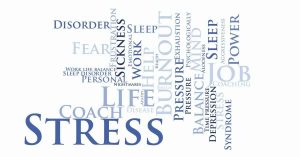First, what leads to you feeling stressed?
Stress is our body’s reaction to an unfavorable situation or threat. An imbalance between your responsibilities and your abilities leads to you feeling stressed. You know what you need to do, but are unsure of whether you will deliver. In such a situation, you may feel emotional and physical tension. This tension often leaves you feeling angry, frustrated, or nervous.
Everybody experiences stress. It is not always a bad thing. It helps you maneuver a tough situation or physical danger. For example, when you hit the brakes when you see a huge truck coming your way. Some people also thrive under the stress of having to meet a deadline. They perform their best under pressure.
Everybody has a different coping mechanism. A lot also depends upon the attitude of the person feeling stressed. Something might be extremely frazzling for someone, but the same thing can be a mere speed bump for another person. But if you are constantly feeling overwhelmed and tense, you might be suffering from chronic stress. When chronic stress goes unchecked for a long time, it can have devastating effects. This may affect your general physical health as well as your mental well-being.
What are the effects of you feeling stressed?
It can harm your mental health
When you feel stressed, it is very likely that you will also feel anxious. In fact, chronic stress often causes anxiety. This is manifested in you feeling constantly worried, afraid, and panicky. It can also lead to depression where a person feels sad or low for no apparent reason – for days on end. When chronic stress goes unchecked for a long time, it can also make you forgetful. It can hamper your thinking and lead to poor concentration. It can also cause sleeplessness and other sleep disorders.
Feeling stressed can cause or aggravate severe hormonal imabalances and skin conditions
Chronic stress can cause hormonal imbalances and reproductive issues in women. It often leads to PCOS, PCOD, hyperthyroidism, etc. This is because there is an imbalance of hormones in the body. It can also hurt the menstrual cycles. When you experience chronic stress for a long period of time, it can lead to eczema and acne. When you suffer from stress-induced acne or eczema, no amount of external and topical medication can effectively treat the condition.
Prolonged chronic stress can also lead to many cardiovascular issues
Feeling stressed often causes your blood pressure to rise. This is further aggravated by poor lifestyle choices. It also paves a way for diabetes and obesity. It can also manifest in the form of frequent digestive disorders.
How can you reduce feeling stressed?
Chronic stress is a common cause of concern among city dwellers living a fast-paced life. If you can recognize the early signs and symptoms of chronic stress, you can take timely action to cope with its effects. Here are some effective remedies that will help you reduce stress:
Exercise
Exercising lowers the stress hormone known as cortisol in the body. When you workout, your body releases endorphins. These feel-good hormones help you feel euphoric. Incorporating an invigorating run or brisk walk in a park, surrounded by nature in your everyday routine can help in destressing or ‘laying off steam’. Research suggests people who work out regularly have a better response to stress and anxiety than those who are physically inactive.
Meditation
Meditating for as little as 20 minutes in a day can help in better management of stress and anxiety. Meditation has gained a lot of popularity in alternate therapy in recent years. But this ancient Vedic technique of training the mind has been around for ages. You can also combine it with other mindfulness techniques such as yoga and pranayama to maximize its benefits.
Write it down
Writing down what is causing the stressful feeling can help you understand your mental state better. Studies have shown that creative writing, journaling, and other forms of written expression of grief and stress are amazing coping mechanisms that help in managing stress and anxiety effectively.
Cannabidiol Oil
Cannabidiol or CBD is one of the many cannabinoids found in cannabis plants, which does not have a mind-altering effect on the body. You can use CBD oil to treat anxiety and depression as well. Preliminary research on animals and control groups of individuals have also shown promising results.
Spend some time with family and friends
Spending time with loved ones can make us feel safe and secure. It can considerably reduce the feeling of panic and fear and put our minds at ease. It is similar to knowing that there is a safety net that will break our fall and prevent us from hitting rock bottom.
Listen to soothing music and nature sounds
Music has the incredible ability to alter our mood. Slow-paced soothing music can help us relax our mind by lowering the blood pressure and stress hormones in the body. Nature sounds such as birds chirping, or waves crashing against rocks can also have a similar effect on our mind and body.
Deep breathing
During stressful situations, our body activates its fight or flight mode. At such times, taking a few deep breaths can slow down racing heartbeats and makes you feel at peace. There are many kinds of deep breathing techniques and all of them have one common goal. They help you focus on the breath and in the process help you relax.

In today’s day and age, stress has become a part and parcel of our daily lives. Everyone feels stressed at some point and better stress management is the key to a healthy and happy life.








